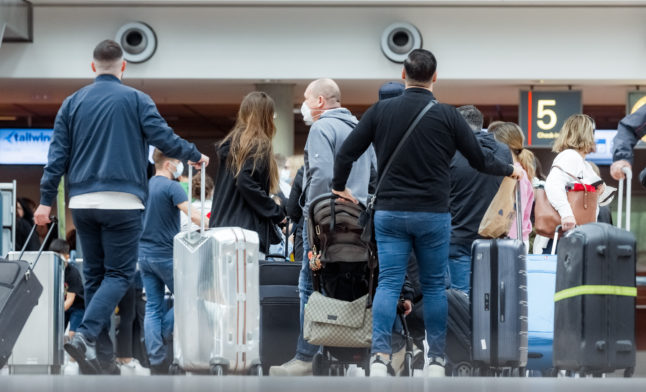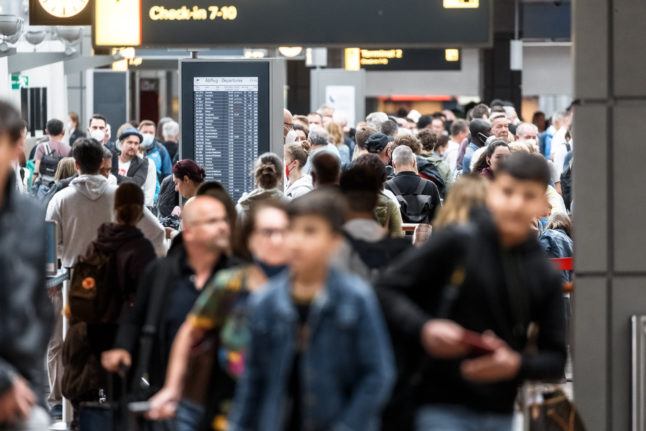What’s happening?
Health Minister Karl Lauterbach said earlier in May that authorities were to ease the Covid travel entry rules.
It means that from June 1st until at least August 31st, travellers entering Germany from abroad no longer need to show proof of their vaccination status, recovery or a recent negative PCR or rapid Covid test.
Up until that point, the so-called 3G rule applied to anyone entering Germany from abroad. That means travellers over the age of 12 have had to show their Covid status before being allowed into the country. This can happen through uploading the proof to the airline when checking in online, showing it to a member of airline staff or, in some cases, showing it at the border before being allowed into Germany.
Travellers who transfer at an airport in Germany have also had to show proof before arriving in the country. It applied both to non-Schengen transit from or to third countries outside the EU, and to transit from or to Schengen states. These rules have now been dropped.
READ ALSO: Germany to relax travel restrictions for summer
However, the rules for people entering Germany from red list (known as virus variant areas) will remain. They have to go into a 14-day quarantine on arrival, even if they have been vaccinated or have recovered. No country is currently a virus variant region.
“Until the end of August, we are suspending the 3G rule on entry,” Lauterbach said. “However, we will continue to keep a close eye on virus variant areas. If such areas are defined, entrants must be quarantined. Even with lower incidences in the summer, we must remain cautious during a global pandemic.”
Why is this changing?
Lauterbach said the relaxation of rules is due to the falling number of Covid infections, which means the situation is more stable.
However, note that the 3G rule is on pause – and it will return from September 1st unless the law is adapted before then.
What does this mean?
This move could be a big boost, especially for families who’ve previously had to shell out on several Covid tests for children before returning to Germany.
It will certainly make summer holidays easier – and cheaper. As we mentioned above, everyone over the age of 12 has had to show their Covid status, so unvaccinated teens have needed to show a negative test.
Are there any other changes to know about?
From June 1st vaccines listed on the WHO emergency use list will be recognised in Germany – not only those approved by the European Medicines Agency (EMA).
A spokesman from the German Health Ministry told The Local: “For entry into Germany, complete vaccination with vaccines other than those approved in the EU will also be recognised in future, provided they are listed in the WHO emergency use list. These include CoronaVac, Sinopharm BIBP and Covaxin.”
In Germany, people are classed as fully vaccinated 14 days after their second jab. After 270 days (around nine months) people also need to show proof of a booster shot to count as fully vaccinated.
READ ALSO: The new rules for entering Germany with an EU Covid pass

Does this mean anyone from non-EU countries can enter, even if they are unvaccinated?
There are additional restrictions that apply to entry from non-EU countries to Germany, and it doesn’t look like these are changing.
Up to this point, you have to be fully vaccinated to enter Germany if you are coming from most non-EU countries. Unvaccinated people are generally not allowed to enter unless they have an essential reason. There are exceptions for German and EU residents.
Germany does, however, allow unrestricted entry for people coming from a group of ‘safe list’ countries.
Children under 12 who are not yet vaccinated can enter the country with proof of a negative test result (PCR test or antigen test) when accompanied by at least one fully vaccinated parent. Children under the age of six do not require proof of a negative test result.
The Health Ministry told us this rule is not part of the 3G entry regulation, and so remains in place.
“Germany plans to abolish the 3G regulation for entry with the fifth amendment to the Coronavirus Entry Regulation (EinreiseV) with effect from 1st June 2022 for the ‘how’ to enter,” said the spokesman.
“However, the EinreiseV does not regulate the ‘whether’ they can enter, i.e. under which circumstances persons from third countries can enter the EU and thus also Germany.”
The spokesman said entry into the EU from non-EU countries is only granted to third-country nationals when they are coming from a country on the EU ‘safe list’ or if they have a compelling reason to entry (including if they are diplomats, seasonal workers or for family reunification).
People whose country is not on the ‘safe list’ but have been “fully vaccinated with an EU-approved vaccine or an EU-equivalent vaccine” can also enter. From June 1st, a vaccine approved by WHO should also be accepted.
You should check with your airline before the trip in case there are any other requirements.
What does this mean?
It means that despite the 3G entry being dropped, people coming from non-EU countries will generally need to show they are fully vaccinated to enter Germany. Though the changes to the variety of vaccines accepted from outside the EU will no doubt make it much easier for many to enter the country.
The German government has more information on this regulation in English.
What else should I know?
Travellers should keep an eye on any risk-level changes to countries they are travelling to Germany from on the Robert Koch Institute’s risk list.
Furthermore, keep in mind that face masks are still mandatory on flights to and from Germany.



 Please whitelist us to continue reading.
Please whitelist us to continue reading.
There are additional restrictions that apply to entry from non-EU countries to Germany, and it doesn’t look like these are changing.
Up to this point, you have to be fully vaccinated to enter Germany if you are coming from most non-EU countries. Unvaccinated people are generally not allowed to enter unless they have an essential reason. There are exceptions for German and EU residents.
Germany does, however, allow unrestricted entry for people coming from a group of ‘safe list’ countries.
The Health Ministry told us this rule is not part of the 3G entry regulation, and so will remain in place.
If you fill in the einreiseamelsung form for entry, and you say you are coming from the USA, it quotes 3G as the rule, not 2G. Germany needs to get their crap straight. Several websites quote different rules and many of the “safe countries” they list have higher infection rates than the USA. Taiwan having the highest rate in the world at the moment. Are unvaccinated tourists welcome or not?
The 270 day rule for over 12s is a major issue coming from the UK. No option for 12-15 to have a booster so effectively banned from entry from around October time when the 270 days expire. Hope rules will relax further as in other EU countries.